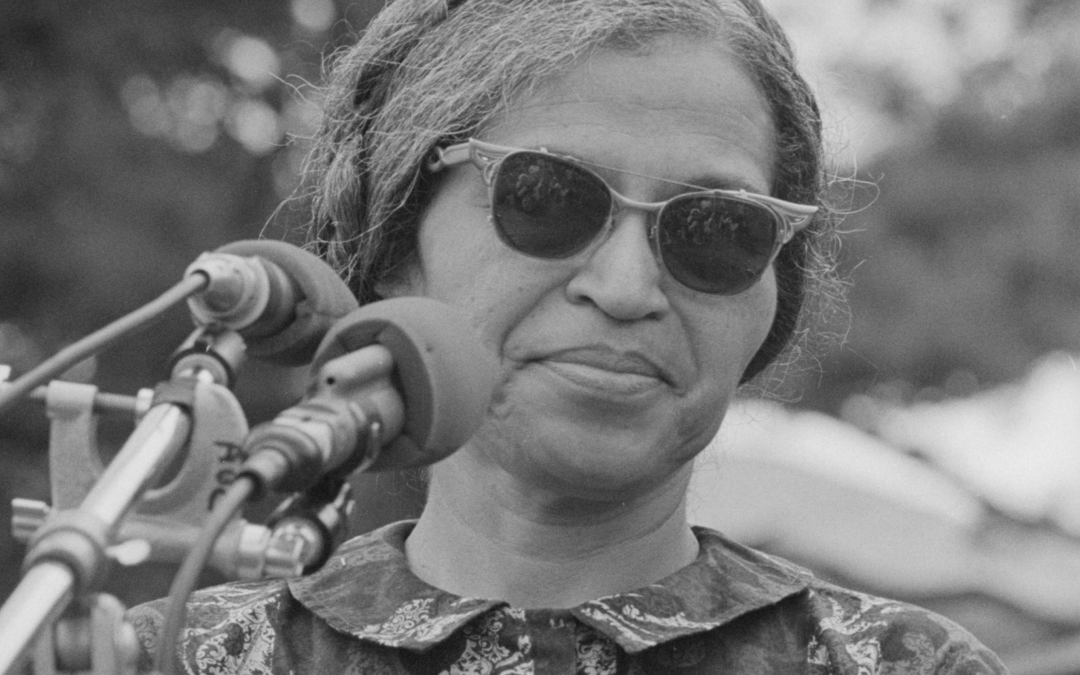February is Black History Month, and Verity would like to highlight Anti-Rape Activist and Civil Rights Icon Rosa Parks and Anti-Rape Activist and sexual assault survivor Recy Taylor.
Rosa Parks was born on February 4th, 1913, in Tuskegee, Alabama. Though Ms.Parks may be best known for helping to spark the civil rights movement in the United States with her refusal to move when a white man demanded that she relinquish her seat on the bus in 1955, this was far from her first introduction to activism. Rosa Parks was one of the many pioneers in the anti-sexual violence movement, which led to the eventual formation of Rape Crisis Work as we know it today. At age 30, Ms. Parks joined the Montgomery chapter of the NAACP, and it was through her work there that she first encountered Recy Taylor.
Recy Taylor was born in Abbeville, Alabama, in 1919. At just 24 years old, Taylor was kidnapped at gunpoint and raped by seven white men while walking home after attending church. Despite receiving death threats from her assailants, Taylor did not stay silent about the violence she had been subjected to; she reported the assault to law enforcement, who were able to identify Taylor’s assailants- all of whom eventually confessed to the crime. Despite their confession, two Alabama grand juries declined even to indict the men.
Ms. Parks herself was a survivor of attempted rape as a child by her adult male neighbor. After hearing of Recy Taylor’s Assault and the lack of response from the criminal justice system, she traveled from Montgomery to Abbeville to meet with Ms.Taylor and offer her support. After speaking with Ms.Taylor and her family, Rosa Parks returned to Montgomery and shared Recy Taylor’s story with African American Activists who helped to publicize the case.
With the help of several of these activist groups, Rosa Parks formed the Alabama Committee for Equal Justice for the Rights of Mrs. Recy Taylor, later shortened to just ‘The Committee for Equal Justice.’ The organization’s focus was to support and empower Black women and assist them in “reclaiming their bodies against sexual violence and interracial rape” (McGuire, 2011). The Committee ran publicity campaigns to raise awareness of the pervasiveness of sexual assault-based hate crimes committed against Black women and sent delegates to Abbeville to investigate Recy Taylor’s assault. Despite the tremendous effort made by Ms. Parks and The Committee, Recy Taylor’s case was eventually brought before a jury, who, despite the fact that the perpetrators had confessed, declined to convict the men of their heinous crimes.
“The history of the rape crisis movement in the United States is also a history of the struggle of African American women against racism and sexism.”
In 2011, the Alabama state legislature apologized to Recy Taylor and acknowledged the morally repugnant actions taken by the state regarding the refusal to prosecute her case. Though Recy Taylor never received justice through the legal system, the legacy of the Committee for Equal Justice lives on. The Committee successfully brought national attention to the issue of interracial sexual violence perpetrated against Black women and empowered Black women to report assaults they had experienced. “Her case became a major catalyst for black women’s civil rights resistance and the intersectional connection between sexual violence and state violence” (Hutchinson, 2017).
The case of Recy Taylor is one case among many. Lost to history are the many cases during this time that went unreported, the many women, especially Black women, who were never believed. Even in today’s climate, we continue to fight for the rights of survivors and for the prosecution of perpetrators. The good news is this: there are more resources for survivors of sexual violence today than ever before – and we have strong and courageous women – women like Rosa Parks and Recy Taylor – to thank for this.
As Gillian Greensite writes, “The history of the rape crisis movement in the United States is also a history of the struggle of African American women against racism and sexism.” The rape crisis movement owes a great deal to the activism of Black women during the Civil Rights Movement. It was through their direct advocacy and organizing efforts that the establishment of the first rape crisis centers in the United States was realized. Rape Crisis Centers such as Verity have since become a vital resource for survivors of sexual violence. The bravery and determination of women like Rosa Parks, Recy Taylor, and so many more, who spoke out about their own experiences of sexual assault and worked to raise awareness of the issue, helped to shift societal attitudes and policies around sexual violence. The legacy of these Black women continues to inspire and inform the work of the rape crisis movement today, as advocates and survivors alike fight for justice and healing in the face of sexual violence.
References:
Brown, D. L. (2018, January 28). The gang rape was horrific. the NAACP sent Rosa Parks to investigate.https://www.thelily.com. Retrieved January 20, 2023, from https://www.thelily.com/the-gang-rape-was-horrific-the-naacp-sent-rosa-parks-to-investigate/
Grim, M. A. (2022, March 17). Rosa Parks: A pioneer against sexual violence: FRCC blog. Front Range Community College Blog | Writing the Front Range. Retrieved January 20, 2023, from https://blog.frontrange.edu/2022/03/03/rosa-parks-a-pioneer-against-sexual-violence/
Hutchinson, S. (2017, December 7). Recy Taylor and the atrocious legacy of all-white juries. HuffPost. Retrieved February 6, 2023, from https://www.huffpost.com/entry/recy-taylor-and-the-terro_b_8507920
Jones, K. (2021, April 21). From Memphis to Combahee: The rape crisis movement owes everything to black women. ZCenter. Retrieved January 20, 2023, from https://zcenter.org/blog/from-memphis-to-combahee/
Mattimore, R. (2017, December 8). Before the bus, Rosa Parks was a sexual assault investigator. History.com. Retrieved January 20, 2023, from https://www.history.com/news/before-the-bus-rosa-parks-was-a-sexual-assault-investigator
Danielle L. McGuire, (2011) At the Dark End of the Street: Black Women, Rape, and Resistance–a New History of the Civil Rights Movement from Rosa Parks to the Rise of Black Power (New York: Vintage Books, 2011)
Rogers, C. of L. L., Neufville, C. of N. M., Randall, C. of A., & Bamberg, C. of S. (2021, January 20). National African American History Month: Remembering Rosa Parks’ work to address sexual assault. The United States Department of Justice. Retrieved January 20, 2023, from https://www.justice.gov/archives/ovw/blog/national-african-american-history-month-remembering-rosa-parks-work-address-sexual-assault


Recent Comments